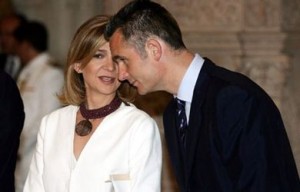
The 19th-century British political economist Walter Bagehot noted that letting “daylight in upon the magic” of monarchy risks diminishing its mystique. A court summons, no doubt, represents a mystique-diminishing dose of daylight, and Princess Cristina’s scheduled April 27 appearance before a judge in Majorca may be dignified but is unlikely to be very edifying.
Still, the royal families of Europe are not – and never have been – paragons of public virtue (as anyone who has spent time in Las Vegas recently may be able to testify). What makes the Nóos Affair so problematic is not simply that it is a royal scandal but that it is a royal financial scandal in the middle of a national financial crisis.
The princess’ summons wasn’t the only instance this week of money problems impinging on a sometimes magical sphere of national life. Real Madrid were reported to be in deep water with the European Commission (a body rarely celebrated for its sporting prowess, though Olli Rehn played in Finland’s premier football league before switching careers and in due course becoming the commissioner with direct responsibility for the euro).
The Commission is unhappy with the complicated deal between Real and the city of Madrid designed to facilitate the renovation of the Bernabéu Stadium. Brussels believes the deal may violate EU state-aid regulations. Needless to say, the financial arrangement that is under scrutiny involves that now entirely predictable ingredient in the modern Spanish financial shenanigan – inflated property prices.
Inflated transfer fees, inflated player salaries and inflated payments for television rights have all been cited in the last 20 years as either the kiss of death for what was once the beautiful game or – alternatively – as a brilliant elixir that has transformed the game from being quite presentable to being drop-dead gorgeous.
In any event, Spanish clubs appear to have been in the vanguard of marrying the two very distinct arts of scoring goals on the one hand and exploring the full potential of creative bookkeeping on the other.
Maybe next year
But if the economic crisis has taught us anything it is the importance of focusing attention on the light at the end of the tunnel, which was the gist of Mariano Rajoy’s address to the National Executive of the ruling party on Wednesday.
Resurfacing in pugnacious style after a period of silence, the prime minister repeated his assertion that his government had faced down twin financial crises in the spring and summer of 2012 while deftly sidestepping a full-scale bailout that would have ended Spain’s economic sovereignty. He acknowledged that 2013 will not be pleasant but he painted a comforting picture of sunny uplands to be reached in 2014.
Next year, the prime minister predicted, will be one of economic growth and job creation, when the people of Spain will be able to see – and benefit from – the results of recent sacrifices.
Alluding to the single most serious aspect of the crisis, the social and economic cost of stratospheric unemployment, Mr Rajoy noted that “no sane person could be satisfied” with this.
Generous redundancy
The recent reluctant decision by Javier Bardem and family to close La Bardemcilla, the tapas bar they have run for 14 years, may or may not be representative of the wider economic crisis.
The family issued a statement noting that the bar had been a victim of the economic downturn “like many small firms” in Spain.
Not precisely like others, however, since a part owner of this firm is one of the country’s most celebrated film stars.
There was some comment when it was revealed that La Bardemcilla staff were to be laid off on terms prescribed under the labour reform legislation on which Mr Rajoy (at least until this week) has set such store and of which Mr Bardem has been one of the most prominent critics.
However, the original plan was subsequently changed, and the redundancy terms were made more generous – not something that can be arranged by every small business without a secondary source of income to draw upon.
Whether the case involves film stars, football clubs or princesses, money almost always takes its toll on magic and mystique.
To read more by Anna Maria O’Donovan visit My Spanish Interlude.
Leave a Reply
You must be logged in to post a comment.